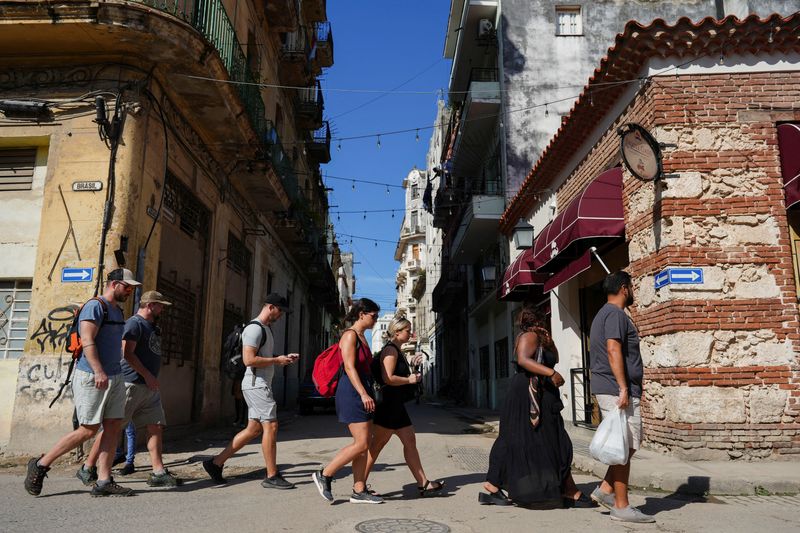By David Sherwood
HAVANA (Reuters) - As blackouts, food, fuel and labor shortages in Cuba grow more acute by the day, a trip to the Caribbean island has become a hard sell.
Cuban government statistics tell the story: Earlier this week, Tourism Minister Juan Carlos Garcia said Cuba saw 2.2 million international visitors this year, well short of its original goal of 3.2 million and less than half of pre-pandemic levels.
This year's decline stalled a fledgling recovery following the COVID-19 pandemic, the government said, a negative trend that Cuban tourism expert Paolo Spadoni says may be hard to reverse.
"Unfortunately, Cuba is becoming every day more unique for all the wrong reasons, and thus more unattractive as a tourist destination," said Spadoni, an economist at Augusta University in Georgia. "Prospects for 2025 are not encouraging."
Cuba has long appealed to tourists attracted by the mystique of a Communist-run island which, at least to visitors, appears frozen in time thanks to a plethora of 1950s autos and towns mostly free of the kind of commercial development seen elsewhere in the Caribbean.
Taxi driver David Sarzo, who drives a vintage U.S. sedan in Havana, said he and his colleagues could not see "any light at the end of the tunnel because of the crisis ... which is leading tourism agents to steer clients away from Cuba."
The ocean-front capital Havana is framed by the commanding El Morro castle and in the countryside, oxen still plow fields where tobacco is grown then rolled by hand.
But three nationwide blackouts in the last months of 2024 touched virtually every facet of island life, including tourism. While some large hotels have generators, lower budget lodging and rental homes often do not, forcing guests in the tropical climate to go without air conditioning.
Following the most recent collapse of the island's electrical grid, the tourism ministry sought to reassure prospective visitors.
"We are prepared to face the current challenges and ensure that tourism activities are developed normally," the ministry said in a statement on social media.
But the bad news has gotten out.
Canada - which sends more tourists to Cuba than any other country - is now telling its citizens to "exercise a high degree of caution in Cuba due to shortages of basic necessities including food, medicine and fuel."
Germany, too, recently issued a similar warning, urging travelers to "carefully consider the necessity" of a trip to the island.
Several businesses have followed suit.
Canadian travel agency Sunwing told trade journal PAXNews it had removed 26 hotels from its list of destinations in Cuba, citing "volatility ... that may shake consumer confidence."
Germany's Condor Airline, which has flown to Cuba for decades, said in a statement earlier this month it would halt its flights to the island beginning in May, preferring "destinations with more demand."

"I traveled here in December last year, and there were more tourists, but this year a lot less," said Canadian tourist Kyle Cong, who attributed the decline to news about recent nationwide blackouts.
"People get concerned," he said.